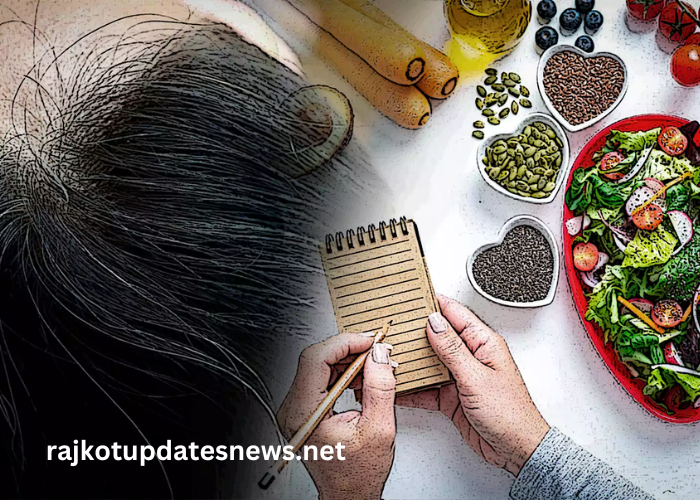White hair is a common concern that affects many people as they age. It can appear prematurely due to various factors, leading to a search for effective ways to manage or prevent it. This article explores the causes of white hair and offers practical, natural methods to prevent its onset and maintain a youthful appearance.
What Causes White Hair?
White hair occurs when the pigment-producing cells in the hair follicles, called melanocytes, stop producing melanin, the pigment responsible for hair color. Several factors contribute to this process:
Genetic Factors
Genetics play a significant role in determining when you will start to develop white hair. If your parents or grandparents experienced early graying, there is a higher likelihood that you might as well. Genetic predisposition is a primary factor that influences the onset of white hair.
Aging
Aging is the most common reason for white hair. As we age, the melanocytes in our hair follicles gradually produce less melanin, leading to the gradual loss of color in our hair. This process is natural and inevitable, but it typically starts in middle age or later.
Nutritional Deficiencies
A lack of essential nutrients can contribute to premature graying. Deficiencies in vitamins such as B12, folic acid, and minerals like zinc and iron can affect the health of your hair and lead to color loss. Ensuring a balanced diet with adequate nutrients can help maintain your hair’s natural color.
Stress
Chronic stress has been linked to premature graying. While the exact mechanism is not entirely understood, it is believed that stress can disrupt the normal functioning of melanocytes, accelerating the graying process. Managing stress through lifestyle changes and relaxation techniques may help mitigate this effect.
Hormonal Changes
Hormonal changes, especially during periods of significant life transitions such as menopause or thyroid imbalances, can impact hair pigmentation. Hormonal fluctuations can affect the production of melanin and contribute to the development of white hair.
Health Conditions
Certain medical conditions can cause premature graying. Conditions such as vitiligo, which causes loss of skin pigment, and autoimmune disorders can affect the pigmentation of hair. Consulting a healthcare professional can help identify and manage underlying health issues contributing to white hair.
Natural Methods to Prevent White Hair
While it may not be possible to completely prevent white hair, several natural methods can help delay its onset and maintain the health and appearance of your hair.
Maintain a Balanced Diet
A well-balanced diet rich in essential vitamins and minerals is crucial for healthy hair. Include foods high in B vitamins, such as whole grains, eggs, and leafy greens. Incorporate foods rich in antioxidants, like berries and nuts, to protect your hair from oxidative stress and support overall health.
Increase Vitamin B12 Intake
Vitamin B12 is essential for hair health and pigmentation. Deficiency in this vitamin can lead to premature graying. Include foods like lean meats, dairy products, and fortified cereals in your diet to ensure adequate B12 intake. For those with dietary restrictions, B12 supplements may be necessary.
Incorporate Antioxidant-Rich Foods
Antioxidants help protect hair follicles from oxidative damage. Foods high in antioxidants, such as fruits and vegetables, can combat the effects of free radicals and support the health of your hair. Incorporate foods like tomatoes, spinach, and green tea into your diet to boost antioxidant levels.
Use Natural Hair Dyes
If you prefer to cover white hair naturally, consider using herbal hair dyes. Products made from natural ingredients like henna, sage, or coffee can provide temporary color without the harsh chemicals found in commercial dyes. These natural options can help maintain your hair’s color while minimizing potential damage.
Manage Stress Effectively
Chronic stress can contribute to premature graying. Implement stress management techniques such as meditation, yoga, or deep-breathing exercises to help reduce stress levels. Regular physical activity and relaxation practices can support overall well-being and potentially slow down the graying process.
Avoid Smoking
Smoking has been associated with premature graying and overall poor hair health. The toxins in cigarettes can damage hair follicles and reduce blood flow to the scalp. Quitting smoking can improve your overall health and potentially slow the graying of your hair.
Massage Your Scalp
Regular scalp massages can improve blood circulation to the hair follicles and promote healthy hair growth. Use natural oils like coconut oil, almond oil, or olive oil for massages. These oils provide essential nutrients and moisturize the scalp, supporting overall hair health.
Stay Hydrated
Proper hydration is essential for maintaining healthy hair. Drink plenty of water throughout the day to keep your hair and scalp hydrated. Hydrated hair is less prone to dryness and damage, which can contribute to premature graying.
Hair Care Tips to Support Healthy Hair
In addition to the natural methods mentioned above, adopting good hair care practices can support overall hair health and appearance.
Avoid Excessive Heat Styling
Frequent use of heat styling tools, such as hair dryers, straighteners, and curling irons, can damage hair and contribute to color loss. Minimize heat styling and use heat protectant products when necessary to reduce potential damage.
Use Gentle Hair Products
Choose hair care products that are gentle and free from harsh chemicals. Opt for sulfate-free shampoos and conditioners that are designed to nourish and protect your hair. Products with natural ingredients can help maintain hair health and prevent unnecessary damage.
Trim Regularly
Regular trims help remove split ends and maintain the overall health of your hair. Trimming every six to eight weeks can prevent breakage and keep your hair looking its best.
Conclusion
White hair is a natural part of aging, but various factors, including genetics, nutrition, and stress, can influence its onset. While it may not be possible to completely prevent white hair, adopting natural methods such as maintaining a balanced diet, managing stress, and using gentle hair care products can help delay its appearance and support overall hair health. By incorporating these practices into your daily routine, you can maintain a youthful look and embrace the natural beauty of your hair as you age.



